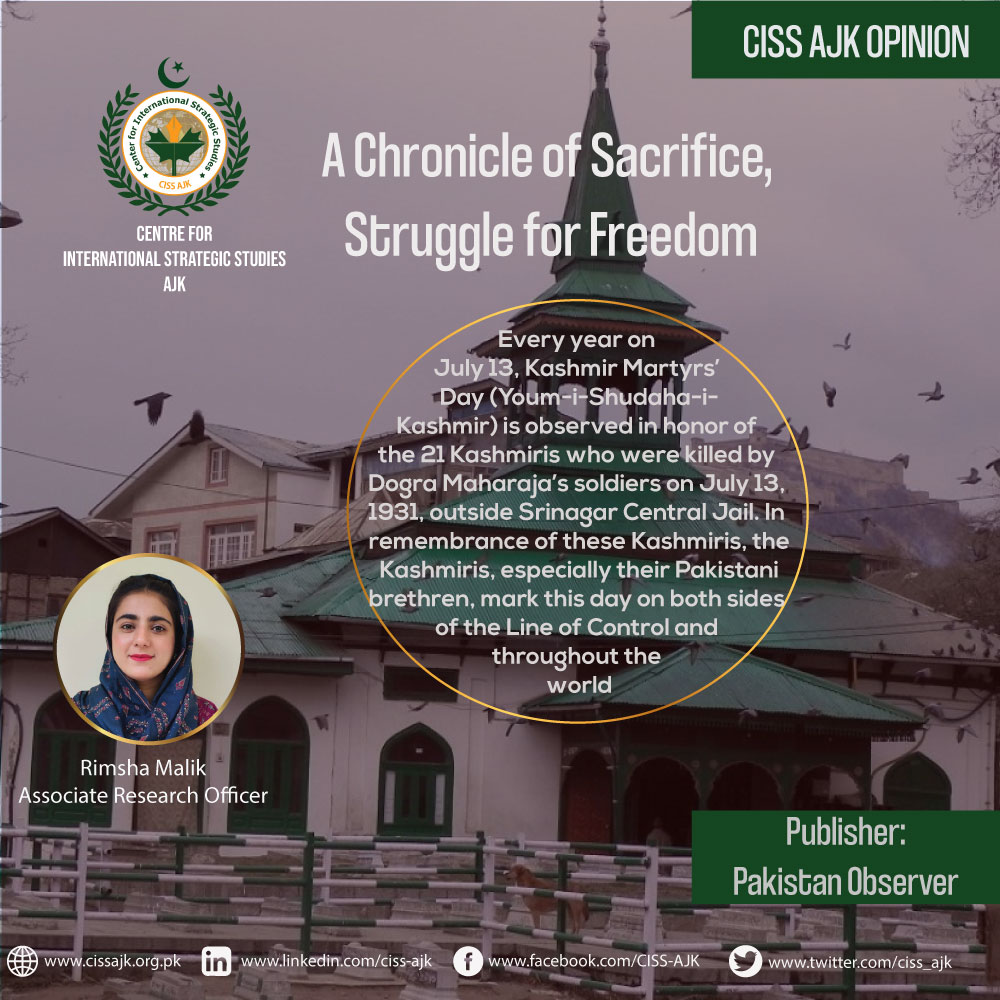633
Every year on July 13, Kashmir Martyrs’ Day (Youm-i-Shudaha-i-Kashmir) is observed in honor of the 21 Kashmiris who were killed by Dogra Maharaja’s soldiers on July 13, 1931, outside Srinagar Central Jail. In remembrance of these Kashmiris, the Kashmiris, especially their Pakistani brethren, mark this day on both sides of the Line of Control and throughout the world. The tyrannical treatment meted out to Kashmiri Muslims by Dogra forces is well documented in Kashmir’s history under the Dogra administration (1846–1947). They were living such a wretched life under Dogra’s authority that it was difficult to tell people apart from beasts. The norm back then was slave labor, high taxes, the death penalty for butchering cows, and perpetual terror. The prohibition of the EidKhutba (Sermon) on April 19, 1931, sparked extensive protests in the city of Jummu that lasted for many days. Immediately after, Dogra soldiers desecrated the Holy Quran, which caused indignation among Muslims across the state. To protest this blasphemy, thousands gathered in Srinagar’s Jamia Masjid. Prominent Kashmiris spoke during one such gathering that was organized in Khankah-e-Muella Srinagar. After the gathering, a young man named Abdul Qadeer shouted, “Destroy its every brick,” while pointing to the Maharaja’s palace. He was taken into custody right away after being charged with sedition. Due to strong public opposition, the court was moved to Central Jail Srinagar, where Abdul Qadir was supposed to be tried. Intense public protests were organized all across the city on July 12, 1931, in response to the court’s relocation.
Thousands of spectators descended on Srinagar’s Central Jail the following day, on July 13, 1931, to watch Abdul Qadeer’s secret trial. A young Kashmiri stood for the Azan as the hour for the required prayer drew near. Soldiers were ordered to shoot at him by Dogra Governor Ray ZadaTartilok Chand. He was martyred, and another young man began the Azan in his place. He too died from gunfire. 21 Kashmiris sacrificed their lives in this way to finish the Azan. People carried the corpses and marched through Srinagar’s streets while yelling anti-Dogra slogans. There was a complete strike throughout the city, which was followed by a week of mourning. The transportation from Srinagar to Jammu and Srinagar to Rawalpindi was stopped from July 13 to July 26, 1931, as a result of this catastrophe, which shocked the entire state. The 21 martyrs are interred in Khawaja Bazar, Srinagar’s Martyrs’ Graveyard.
The Kashmiri leadership realized the necessity to establish a political organization, the Muslim Conference (MC), in response to these terrible atrocities in order to further their campaign for independence. After that, on July 19, 1947, the MC voted a resolution to annex Kashmir to Pakistan due to its proximity geographically, majority Muslim (77%), language, and cultural ties to Jammu and Kashmir. The state of Jammu and Kashmir (J&K), which had a majority of Muslims, chose to join Pakistan during the subcontinent’s division. But Dogra Raja, Sir Hari Singh, a Hindu who was in power in J&K with the help of Indian Prime Minister Jawaharlal Nehru and Governor General Lord Mountbatten, allied with India. In order to give Indian soldiers a land passage into J&K, the Radcliffe Boundary Award granted India the Gurdaspur District, a region with a mainly Muslim population.
On October 27, 1947, Indian forces attacked Srinagar and violently captured J&K, completely violating the partition arrangement. On December 31, 1947, as Pakistan replied militarily, India appealed to the UN Security Council for help. As a result of UN resolutions calling for a plebiscite in Kashmir, a ceasefire eventually took effect on January 1, 1949. India reneged on its promise to conduct a vote on February 5, 1964. Instead, Kashmir was deemed to be a fundamental element of Indian unity by the Indian Parliament. India retreated from its promise to conduct a referendum on February 5, 1964. Instead, the Indian Union of Parliament declared Kashmir to be a fundamental component of it. A concerted campaign by the Indian army and paramilitary forces against Muslim Kashmiris has included various forms of state terrorism since 1989. It has taken the form of violent techniques such as crackdowns, curfews, illegal detentions, massacres, targeted killings, sieges, burning of homes, torture, disappearances, rape, breaking of legs, molestation of Muslim women, and the death of people in fictitious encounters. Articles 35A and 370 of the Constitution, which granted the disputed territory of the IIOJK a special status, was repealed by the Indian government, led by the fanatic Indian Prime Minister Narendar Modi, the head of the extremist party BJP, on August 5, 2019, bringing India’s brutal actions against the Muslim residents of Kashmir to a head. Jammu and Kashmir were divided into two union territories, Jammu and Kashmir and Ladakh, to be governed by the federal government. In order to alter the IIOJK’s ethno-demographic composition, Indian authorities have also given nearly 1.8 million residence certificates to non-Kashmiris.
On July 13, as the world observes Youm-i-Shuhada-i-Kashmir (Day of the Martyrs of Kashmir), Kashmiris reaffirm their commitment to persist in the ongoing struggle for liberation. They seek to achieve their legitimate right of self-determination, as acknowledged by the relevant United Nations resolutions, and strive for the independence of Kashmir from the oppressive Indian government. Similar to the Dogra rulers in the past, the Indian rulers are accused of perpetrating state terrorism in the Indian Occupied Kashmir (IOK). The commemoration of Martyrs’ Day provides a renewed vigor to the unwavering efforts of the Kashmiris in their pursuit of justice.
—The writer is Researcher at Centre for International Strategic Studies, AJK. Working on Cyber Warfare and National Security.
Email: rimsham156@gmail.com

